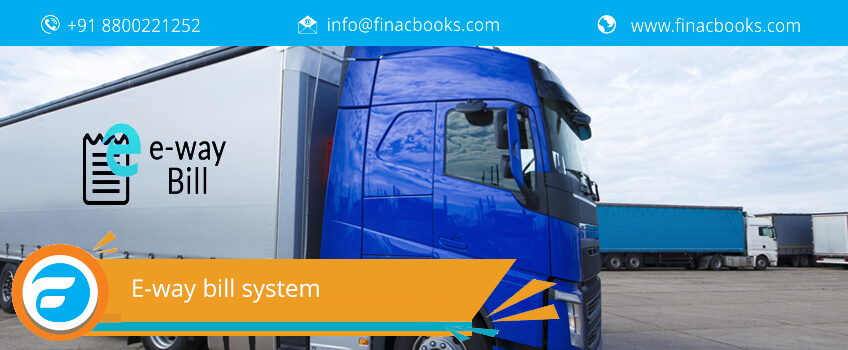What is an E-way bill?
An E-waybill is a receipt or a document provided by a carrier that contains information and instructions on the transport of a consignment of goods. The information includes the consignor's and consignee's names, the consignment's origin, destination, and route.Electronic Way Bill (E-Way Bill) is a compliance technique in which the person causing the movement of goods uploads the necessary information prior to the movement of goods and generates an e-way bill on the GST portal using a digital interface.
Without an e-way bill generated on ewaybillgst.gov.in, a GST registered person cannot move goods in a vehicle with a value greater than Rs.50,000 (single invoice/bill/delivery challan).Once the e-way bill is generated, it is assigned a unique e-way Bill Number (EBN), which is accessible to the supplier, recipient, and transporter.Alternatively, an E-way bill can be generated or cancelled by SMS, an Android application, or through site-to-site connectivity via an API.

Purpose of E-way bill
The e-way bill is a system for ensuring that items are transported in accordance with the GST Law and is an effective tool for tracking the movement of goods and detecting tax fraud.
When should the e-way bill be generated?
If the value of the consignment exceeds Rs.50,000/-, except for certain specified goods intended for job work, goods intended for export with a Customs seal fromthe factory to port, airport, imported goods, ICD, goods sent based on approval, exhibition or fairs purposes, removal for testing, removal from the factory to the weighbridge for goods weighment and return to factory up to a distance of 20 kilometres, inward supply from unregistered person, sales return, SKD/CKD, for own use and exempted goods.
Accordingly, e-way Bills will be generated mandatorily on the common portal for all sorts of movements in case the value of the goods exceeds Rs.50,000; however, E-way Bills needs to be generated mandatory even if the value of goods consignment is less than Rs.50,000 in the following cases -
- Inter-state movement of goods from the principal to the job-worker;
- Handicraft goods are carried between States or Union territories by a person who has been exempted from the registration requirement under clauses (i) and (ii) of section 24 of the CGST Act.
The phrase “Consignment Value” referred to the value determined in accordance with section 15 of the CGST Act and specified on the invoice, bill of supply, or delivery challan, as applicable, inclusive of any relevant tax. However, where an invoice is given for both exempt and taxable supply of goods, such consignment value shall exclude the value of exempted supply ("Notice No. 12/2018")
Who should generate the e-way bill?
- Registered person - When goods worth more than Rs.50,000 are transported to or from a registered individual, an e-way bill must be generated. Even if the value of the goods is less than Rs.50,000, a registered person or transporter may choose to generate and carry an e-way bill.
- Unregistered persons - Unregistered individuals must also generate an e-Way Bill. However, where an unregistered person makes a supply to a registered person, the receiver is responsible for adhering to all compliance requirements as if they were the supplier.
- Transporter - If the supplier has not developed an e-Way Bill, transporters moving goods by road, air, or rail must also generate one.
When is an e-way bill not required?
It is not essential to generate an e-way Bill in the following circumstances:
- When a non-motorized vehicle is the means of transport.
- Transportation of goods from a Customs port, airport, air cargo complex, or land customs station to an Inland Container Depot (ICD) or Container Freight Station (CFS) for Customs clearance.
- Transportation of goods under the supervision of customs or with a customs seal.
- Transportation of goods under customs bond from an ICD to a customs port or from one customs station to another.
- Cargo in transit moved to or from Nepal or Bhutan.
- Movement of goods as a consignor or consignee caused by a defensive formation under the Ministry of defence.
- Cargo containers that are empty are being moved.
- Consignor bringing goods to or from or between business place and a weighbridge for weighing at a distance of 20 km, accompanied by a Delivery challan.
- Rail transportation of goods where the consignor is the Central Government, State Governments, or municipal government (Local authority).
- Goods are specifically exempted from the E-Way bill obligation under the applicable state/union territory's GST rules.
- Transportation of certain specified items- Includes the list of exempt supplies of goods, Annexure to Rule 138(14), and goods treated as not supplied under Schedule III, as well as certain schedule to Central tax rate notifications.
Note: If the distance between the consignor or consignee and the transporter is less than 50 kilometers and the shipment is within the same state, Part B of the e-Way Bill is not required to be completed.
Documents or details necessary to generate aneWay Bill
- Invoice/Bill of Supply/Challan for the consignment of goods.
- Road transport - Transporter identification number or vehicle identification number.
- Transportation through rail, air, or ship — Transporter identification number, transport document number, and document date.
Validity of e-way bill
The validity of an e-way bill is determined by the distance travelled by the goods. Validity is calculated by the date and time of the e-way bill's generation.
|
Type of conveyance |
Distance |
Validity of EWB |
|
For over-dimensional cargo |
Less than 20 Kms For every additional 20 Kms or part thereof |
One day Additional one day |
|
Other than Over dimensional cargo |
Less than 100 Kms For every additional 100 Kms or part thereof |
One day Additional one day |
Additionally, the validity of anEway bill can be extended. The creator of such e-way bills must either extend its validity four hours before expiration or within four hours after its expiration.
Blocking and Unblocking of E-way Bill
- E-way bill generation is blocked for taxpayers who have not submitted returns for the preceding two consecutive months/quarters.
- Thus, if a taxpayer fails to file GSTR-3B for two or more consecutive months, he or she will be unable to generate e-way bills for dispatches and receipts.
- Only after a taxpayer submits GSTR-3B are the e-way invoices unblocked the next day.
- From the 2nd of December 2019, the system of e-way bill blocking was implemented.
For example, if a taxpayer does not file his GSTR-3B for the months of April and May 2021, his or her GSTIN will be blocked on the e-way bill portal beginning from June. The government's primary objective is to track down and bring non-filers of GST returns into compliance.











